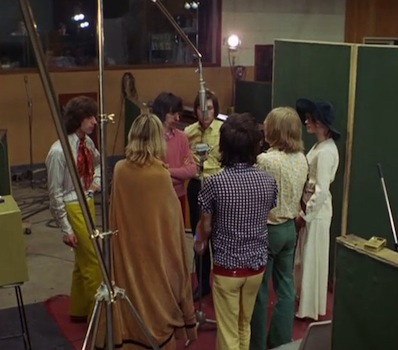Godard: Sympathy For The Devil (1968)
 Friday, December 12, 2014
Friday, December 12, 2014 
Released as the concert film was just starting to gain traction, Jean-Luc Godard’s first documentary offered a fascinating alternative – a rehearsal film – that in some ways feels more prescient of music television than music cinema, although its style and aspiration is highly cinematic. Setting out to answer the question of where a song actually comes from, Godard alternates footage of the Rolling Stones rehearsing what would come to be “Sympathy For The Devil” with a series of tableaux that range from a personification of Democracy to a series of interviews with Black Panthers, and are connected mainly by a certain tendency towards socialist propositions, statements and manifestos. At first, the two parts of the film feel a little incongruous, but as time goes by, it starts to feel as if Godard is aiming to evoke the whole swathe of competing, often contradictory voices simmering beneath the surface of this countercultural anthem, the crowds behind the song, and the crowds that would end up listening to the song, which feel even more viscerally present than they might in a conventional concert film. While it’s fascinating, then, to hear the song evolving and transforming, it’s even more fascinating to witness how organically and subliminally Godard intertwines it with cultural marginalia, bric-a-brac and detritus that at first glance would appear to be light years away from it – an unconscious palimpsest of influences that often makes the band feel more like a radio antenna than a collection of individuals, absorbing sound bites and frequencies from near and far. As much as the song does move towards a finished, refined work – in fact, you only feel that it’s only by absorbing Godard’s own radical presence in the studio that it manages to becomes such a perfect anthem – Godard also beautifully expands and elasticises the different layers and parts until it feels like a collaboration with its historical moment, a pressure point for an entire generation and epoch, as the rehearsal gradually turns into a jam session, devolving the music back into the ether, not unlike the first few moments after you’ve finished listening to a song but can still hear it in the air and world around you. Shot in its entirety in long, liquid pans, as if Godard were trying to gather up as much of the present moment as possible, or trying to make the song as panoramic and expansive as possible, trying to fit it to its historical horizon, it’s mystical and materialist at the same time – a vision of the Stones as so many vehicles for cultural energies that exceed and dwarf them, while making them seem more flamboyantly attuned to their moment at the same time.
Reader Comments